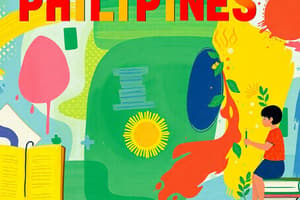Podcast
Questions and Answers
What is the primary focus of early childhood education?
What is the primary focus of early childhood education?
- Advanced degrees and specialized training
- Foundational academic and life skills
- Basic skills and socialization (correct)
- Cultural heritage and classical education
Which type of education occurs outside formal educational institutions?
Which type of education occurs outside formal educational institutions?
- Tertiary Education
- Primary Education
- Formal Education
- Informal Education (correct)
What is a characteristic of non-formal education?
What is a characteristic of non-formal education?
- Structured curriculum and defined qualifications
- Learning through self-study without organization
- Organized learning outside the formal system (correct)
- Focus on classical education and cultural heritage
What is a primary characteristic of progressive educational philosophy?
What is a primary characteristic of progressive educational philosophy?
Which trend in education emphasizes continuous learning opportunities throughout life?
Which trend in education emphasizes continuous learning opportunities throughout life?
What challenge in education refers to disparities in educational opportunities?
What challenge in education refers to disparities in educational opportunities?
Which level of education primarily prepares students for higher education or vocational training?
Which level of education primarily prepares students for higher education or vocational training?
What is a key aspect of technology integration in education?
What is a key aspect of technology integration in education?
Flashcards are hidden until you start studying
Study Notes
Definition of Education
- Process of receiving or giving systematic instruction.
- Can occur in formal (schools, universities) and informal (home, community) settings.
Types of Education
-
Formal Education
- Structured educational institutions (schools, colleges).
- Defined curriculum and qualifications (degrees, diplomas).
-
Informal Education
- Learning outside formal institutions (workshops, self-study).
- Lacks a structured curriculum.
-
Non-formal Education
- Organized learning activities outside the formal system (adult education, community training).
Levels of Education
-
Early Childhood Education
- Focus on basic skills and socialization.
-
Primary Education
- Foundational academic and life skills.
-
Secondary Education
- Prepares for higher education or vocational training.
-
Tertiary Education
- Higher education institutions (universities, colleges).
- Advanced degrees and specialized training.
Educational Philosophies
- Tradition-based: Focus on classical education and cultural heritage.
- Progressive: Emphasizes experiential learning and problem-solving.
- Constructivist: Learners construct knowledge through experiences.
Importance of Education
- Promotes personal and social development.
- Enhances employment opportunities and economic growth.
- Encourages critical thinking and informed citizenship.
Current Trends in Education
- Technology Integration: Use of digital tools in learning (e-learning, online courses).
- Lifelong Learning: Continuous learning opportunities throughout life.
- Inclusive Education: Catering to diverse learning needs and backgrounds.
- Global Education: Awareness of international issues, cultural exchange.
Challenges in Education
- Access and Equity: Disparities in educational opportunities.
- Quality of Education: Variability in teaching standards.
- Funding: Limited resources for schools and educational programs.
- Adaptation to Change: Keeping pace with technological advancements and societal shifts.
Definition of Education
- Education is a process of receiving or giving systematic instruction, encompassing both formal and informal settings.
- Formal settings include schools and universities, while informal learning occurs at home, in communities, or through self-directed means.
Types of Education
- Formal education occurs within structured institutions like schools and colleges, following a defined curriculum and leading to qualifications such as degrees or diplomas.
- Informal education embraces learning outside structured institutions, encompassing workshops, self-study, and experiences that lack a formalized curriculum.
- Non-formal education involves organized learning activities outside the formal system, such as adult education or community training programs.
Levels of Education
- Early childhood education focuses on basic skills development and socialization, laying the foundation for future learning.
- Primary education introduces foundational academic and life skills, often commencing at around age 5 or 6.
- Secondary education prepares students for higher education or vocational training, encompassing subjects like mathematics, science, languages, and humanities.
- Tertiary education encompasses higher education institutions like universities and colleges, offering advanced degrees and specialized training.
Educational Philosophies
- Tradition-based education emphasizes classical education and cultural heritage, focusing on established knowledge and methods.
- Progressive education emphasizes experiential learning and problem-solving, encouraging active student participation and a hands-on approach.
- Constructivist education views learners as active constructors of knowledge, emphasizing individual experiences and interpretations.
Importance of Education
- Education fosters personal and social development, promoting critical thinking, problem-solving, and self-awareness.
- It enhances individual and societal well-being, contributing to economic growth and employment opportunities.
- Education equips individuals with the knowledge and skills needed to engage in informed citizenship, participate in democracy, and address societal challenges.
Current Trends in Education
- Technology integration is transforming classrooms with digital tools, incorporating e-learning platforms, interactive software, and online courses.
- Lifelong learning is becoming increasingly important, encouraging individuals to pursue continuous learning opportunities throughout their lives.
- Inclusive education seeks to cater to diverse learning needs and backgrounds, ensuring access and equity for all learners.
- Global education fosters awareness of international issues, cultural exchange, and a broader understanding of the interconnected world.
Challenges in Education
- Access and equity remain critical challenges, addressing disparities in educational opportunities across different socioeconomic backgrounds.
- Ensuring quality of education requires ongoing attention to teaching standards, curriculum development, and resource allocation.
- Adequate funding for schools and educational programs is essential, addressing financial gaps and supporting access to quality education.
- Adaptation to change necessitates continuous review and improvement, keeping pace with technological advancements and evolving societal needs.
Studying That Suits You
Use AI to generate personalized quizzes and flashcards to suit your learning preferences.




